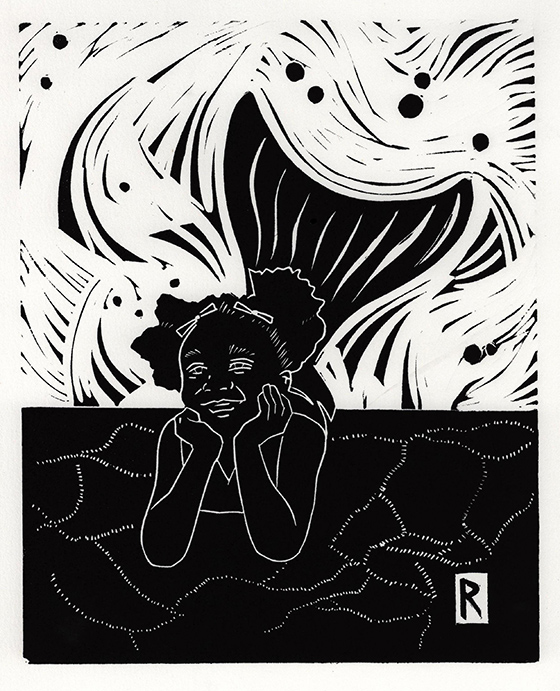
“Frances, Frances!” distant voices sang out. “Come on, before we’re late for school again.”
But Frances remained still, eyes closed, lost in an imaginary world where she darted quick as fish through crystal clear blue water.
She’d been daydreaming like this since she first heard about the new public swimming pool, the first in the small Midwestern town where she lived. A giant banner, swinging proudly in the fresh morning breeze, confirmed it.
“Grand Opening June 20th! Everyone is invited!”
Everyone, thought Frances longingly. Does that include me?
“Frances, stop daydreaming about that pool,” her friend John said as he, Frances and their friend Emily set out for school. “You know colored people will never be allowed to swim in it.”
“I can dream, can’t I?” she said, defiantly. “After all, it is 1952. My daddy says that anything is possible and I believe him! He and the other colored soldiers fought so bravely that President Truman decided to integrate the Army—something no one ever thought would happen.”
“I guess,” John said, rolling his eyes, “but they are soldiers—they’re important!”
Frances’ face grew hot and she frowned, looking down, feeling silly and wishing she had never said anything. Then Emily piped up.
“I think Frances is right. My father says it’s a new day.” Frances smiled gratefully at her.
They arrived at the white children’s elementary school and said goodbye to Emily as she ran to the front door. But suddenly, Emily stopped and turned back to look at them.
“Maybe someday we will even go to school together.” John and Frances burst out laughing and walked on.
After school, when Frances got home, she sat, staring out the window.
“Frances, what’s on your mind?” her father asked.
“Well,” she said, her voice barely a whisper, “do you think that colored people will get to swim in the new pool?” Her father simply hugged her but remained silent.
That night, Frances dreamed once again of the pool. This time she was a mermaid slicing through the water.
The following Sunday, Frances’ family went to church. After his sermon, Frances’ father looked down at her and smiled.
“Our children want to swim in the new public pool and they should, even if we have to face trouble,” he said, smiling at her. “This is about their future.”
Trouble? Frances breathed in sharply as she suddenly remembered the “Whites Only!” signs on drinking fountains she saw when visiting her grandmother in Alabama and hushed voices telling stories—when they thought she wasn’t listening—about black people who were hurt simply trying to vote. Was she being selfish? Swimming in the pool, she realized, was about much more than what she wanted.
The day came. Frances and her neighbors stood outside the pool’s entrance, gathering their courage. “Let’s go,” her father said briskly, and with that, they entered.
“Welcome to the Community Pool!” the cheerful banner declared.
Frances’ eyes lit up. It was even more beautiful than she expected. The bright blue water sparkled under the sun, and the waves rippled and shone. However, the silent eyes that met their entrance cast a dark shadow. She began to turn away, but then her father calmly walked to the edge of the pool, climbed into the still blue waters and held out his hand to her.
She breathed out slowly, put her hand in his, closed her eyes and jumped in. The cool water surrounded her. When she rose to the surface and opened her eyes, she was shocked to see most of the townspeople leaving. It did not feel special or welcoming. That night, Frances did not dream of mermaids or bathing beauties.
The next day, the air felt stale, like day-old bread. When Frances and her father walked back to the pool, they saw the welcoming banners and balloons were already torn down. The townspeople stood, arms crossed, frowning and whispering. Suddenly, a hush fell across the crowd.
Frances’ eyes widened as she saw four police officers approach; her father left her side and went on to face them alone. But then her heart soared! Walking toward them was Emily, Emily’s father and a group of other veterans, black and white! The men joined her father and began talking to the police officers.
The next thing Frances knew, her father was coming toward her, smiling. “Let’s swim!” he shouted.
The water once again sparkled like diamonds. Frances and Emily joined hands and jumped in. Their fathers shook hands and stood together watching their daughters. The police and the townspeople looked uncertain at first and then relieved.
Frances was relieved, too. Everyone,’ she thought, happily, does include me.